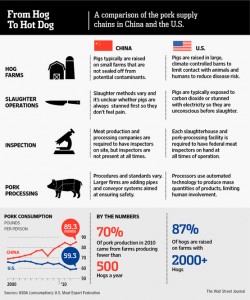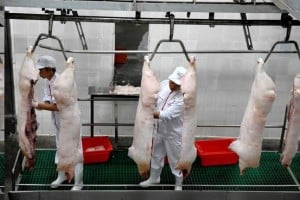As the Chinese population and economy continue to grow, safer and more efficient industrialization practices are necessary to keep up with the demands of a hot dog hungry China. This is not an exaggeration as China is “the world’s largest consumer of pork.” A recent takeover of Smithfield Foods by Shuanghui Holdings Ltd., “China’s biggest meat processor,” will provide valuable insight into industry practices that are commonplace in the U.S. Current processing methods in China lack quality control as the majority of meat is produced by small farms that process less than 500 hogs per year.
 These “conditions on smaller farms can be squalid, with a lot of physical contact between farmers and animals, which can transmit disease.” This type of environment can become a breeding ground for contamination leading to outbreaks of diseases like swine flu and foot-and-mouth disease, having major health implications on Chinese consumers. Authorities blame irresponsible farming practices and the disjointed meat processing system that is not easy to “regulate and makes it more difficult to avoid bad practices.”
These “conditions on smaller farms can be squalid, with a lot of physical contact between farmers and animals, which can transmit disease.” This type of environment can become a breeding ground for contamination leading to outbreaks of diseases like swine flu and foot-and-mouth disease, having major health implications on Chinese consumers. Authorities blame irresponsible farming practices and the disjointed meat processing system that is not easy to “regulate and makes it more difficult to avoid bad practices.”
In contrast, the highly sophisticated and streamlined systems of pork production in the U.S. is often viewed negatively by Americans and referred to as “factory farming.” Smithfield’s facilities have the “capacity to slaughter as many as 110,000 hogs a day,” and most U.S. farms are much larger than their Chinese counterparts, raising over 2,000 hogs annually. Ironically, these modern processing techniques are the envy of Chinese authorities who are looking to utilize the “expertise of Smithfield’s management team to enhance its pork-processing facilities.” Skeptics claim that the Shuanghi-Smithfield partnership “will exacerbate such problems as complex supply chains and food-contamination risks.”
Although the trend in U.S. agriculture is to go “back to the start” as expressed in marketing campaigns by environmentally conscious companies like Chipotle Mexican Grill, this is not the reality in China. As health out-breaks are more widespread in this Asian country and regulation lacking, efforts to “control food safety” and create more modernized processing methods are a welcomed site.
In such an industry, operational expertise will prove essential in restructuring the pork processing system in China. They will likely face challenges like determining adequate process and capacity design for farming facilities and distribution channels; forecasting to meet the demands of a growing population;  and improving inefficient and broken supply chains. Improved product quality will likely be most prominent and follow a manufacturing-based definition as increased standards will ensure a safer finished product.
and improving inefficient and broken supply chains. Improved product quality will likely be most prominent and follow a manufacturing-based definition as increased standards will ensure a safer finished product.
On a personal note, I am an advocate for more naturally produced food in smaller farming environments, yet I understand that the demands and current conditions in China are quite different from the U.S. All criticism aside, the majority of the U.S. population relies on the safe meat supply provided by corporations like Smithfield to ensure peace-of-mind at the dinner table. How do you think that the new deal between Shuanghi and Smithfield will impact Chinese and U.S. consumers, respectively. Will the Chinese citizens have a similar sentiment toward industrialized farming practices in future decades?